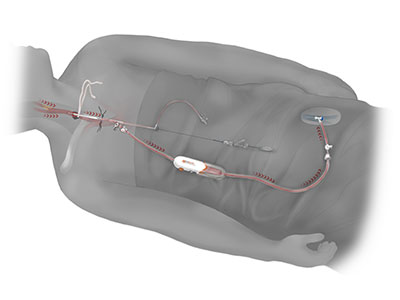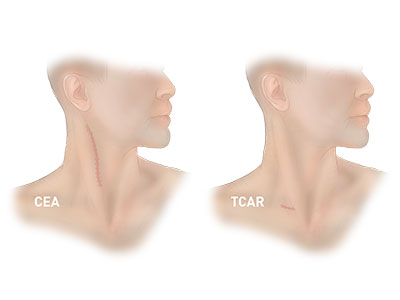TransCarotid Artery Revascularization (TCAR)
Carotid artery disease is usually silent until it severely blocks a carotid artery, leading to whooshing sounds, transient ischemic attack (TIA) or stroke. Our cardiovascular doctors may recommend several treatment options when any of these happen, including transcarotid artery revascularization (TCAR).
A Less Invasive Approach to Treating Carotid Artery Disease
Desert Care Network offers TCAR, a new and advanced treatment approach for patients with carotid artery disease who may not be safe to have open surgery. Since every patient has different needs, our cardiologists will determine if the TCAR procedure is best for you based on several factors, including your age, symptoms and medical history. Whatever may have damaged the inner layers of your carotid arteries, our cardiovascular surgeons, doctors, nurses, technologists and administrative staff are ready to welcome you with high-quality, compassionate care.
What Is Carotid Artery Disease?
Carotid artery disease happens when plaque builds up in one or both of the neck’s main arteries, narrowing and slowing down blood flow and potentially causing a stroke, also called a brain attack. Your carotid arteries feed oxygen-rich blood to the brain, so they are vital for day-to-day functioning. Carotid artery disease causes about one-third of all stroke cases, with 427,000 new diagnoses in the United States annually.
What Are the Risk Factors for Carotid Artery Disease?
Some of the primary risk factors for carotid artery disease include:
- Being overweight or obese
- Diabetes
- Family history of atherosclerosis
- High blood pressure
- High blood cholesterol
- Metabolic syndrome
- Old age
- Sedentary lifestyle
- Unhealthy diet
Suppose you are at an increased risk for carotid artery disease. We recommend that you schedule an appointment with one of our cardiologists in Palm Springs and the Coachella Valley for proper diagnosis.
How Do You Know if Something Is Wrong With Your Carotid Artery?
Carotid artery disease may not cause symptoms at all. But one of the first signs of carotid artery disease is a TIA or a mini-stroke. It’s called a mini-stroke because you may experience some or all of the symptoms of a stroke, but they usually subside within a 24-hour period.
Some of the symptoms of stroke and mini-stroke include:
- Difficulty seeing in one or both eyes
- Dizziness or loss of balance
- Inability to move one or some of your limbs
- Severe headache
- Trouble understanding speech or speaking
- Weakness or numbness in the face or limbs (usually in just one side of the body)
If you experience these symptoms, even if they stop right away, please call 9-1-1 or ask someone to bring you to the nearest emergency room immediately.
How Do Doctors Diagnose Carotid Artery Disease?
Our cardiologists at Desert Care Network can help diagnose carotid artery disease by first checking your risk factors, medical history, family history and asking about your symptoms. Doctors may also recommend further tests and screenings if they hear a whooshing sound (called a bruit) through a stethoscope in your neck. A bruit may be an indication of blockages in your carotid arteries.
Some of the screenings that doctors request to diagnose carotid artery disease include a carotid artery ultrasound or angiography.
What Is a TCAR Procedure?
 TCAR is a less-invasive alternative to carotid endarterectomy (CEA), a traditional open surgery that treats carotid artery disease. Surgeons perform the TCAR procedure through a smaller incision in the neck. TCAR may finish in less than an hour,
which is also less than half the time of carotid endarterectomy. With less surgery time, TCAR may decrease the stress on your heart and reduce the risk of a heart attack during the procedure.
TCAR is a less-invasive alternative to carotid endarterectomy (CEA), a traditional open surgery that treats carotid artery disease. Surgeons perform the TCAR procedure through a smaller incision in the neck. TCAR may finish in less than an hour,
which is also less than half the time of carotid endarterectomy. With less surgery time, TCAR may decrease the stress on your heart and reduce the risk of a heart attack during the procedure.
One of the good things about TCAR is that it temporarily reverses your blood flow during surgery. Doctors divert tiny bits of plaque that may break off from the brain to prevent stroke. The surgeon also places a stent inside the artery to stabilize the plaque, minimizing future stroke risk.
How Is TCAR Better for You?
 There are two other treatment options for carotid artery disease: the CEA and the transfemoral carotid artery stenting. These treatment options are proven to treat
plaque blockages, but they have limitations and carry a higher risk of stroke during the procedure. Some of the advantages of TCAR surgery over the other treatment options include:
There are two other treatment options for carotid artery disease: the CEA and the transfemoral carotid artery stenting. These treatment options are proven to treat
plaque blockages, but they have limitations and carry a higher risk of stroke during the procedure. Some of the advantages of TCAR surgery over the other treatment options include:
- Having a low procedural stroke rate
- Less invasive compared to CEA
- Lower chances of surgical complications (i.e., infection, heart attack, nerve injury, etc.)
- TCAR recovery may be faster than traditional surgery
- May cause less pain and more minor scars
- Patients almost always go home the next day after surgery
How Safe Is a TCAR Procedure?
More than 10,000 TCAR procedures have been performed worldwide. TCAR may be new, but it has undergone extensive study, and it comes with excellent clinical data. The data are so compelling that the Centers for Medicare, Medicaid Services (CMS), Society of Vascular Surgeons and the U.S. Food and Drug Administration (FDA) came together in September 2016 to create a program that supports its reimbursement.
We Want What’s Best for Your Carotid Arteries
The American Heart Association has recognized Desert Care Network as a hospital that adheres to the latest scientific treatment guidelines through its Get with the Guidelines® program.
You can rest assured that our cardiology team, together with the rest of our staff, is committed to providing expert care so you can live a healthy and fulfilling life. Our surgeons perform TCAR procedures with the utmost caution while other healthcare professionals attentively offer the guidance and support you need.
The first step to knowing if you have carotid artery disease is to schedule an appointment with one of our cardiologists. Please call 877-734-8891 to request a doctor’s referral. Meanwhile, if you experience symptoms of a stroke or a mini-stroke, call 9-1-1 or ask someone to bring you to the nearest emergency room as soon as possible.
Find a Cardiologist
Are you at an increased risk for carotid artery disease? Please see one of our doctors for diagnosis and treatment.

